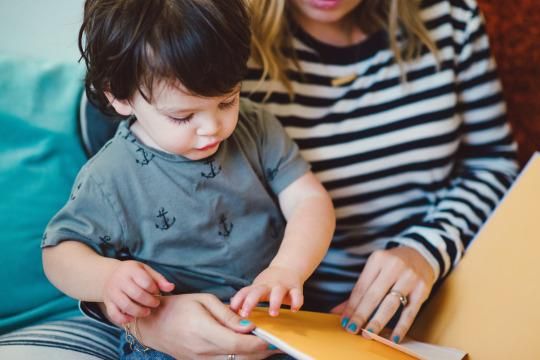Whether it’s a classic such as Where the Wild Things Are or a new bestseller like The Rabbit Who Wants to Fall Asleep, bedtime stories have always been a big hit with little kids.
They’re a hit with moms, dads, and educators too, thanks to the awesome brain and behavioral outcomes they offer. Reams of studies link reading aloud to kids with academic success, creativity, and a stronger bond between parents and their offspring.
But it’s only recently that science has started looking into why books promote these benefits. One recent study from Psychological Science suggests that being read to builds a child’s vocabulary, and that in turn makes her more prepared to learn to read in the future.
Study authors evaluated the types and variety of words in 100 picture books and then compared them to the words toddlers and preschoolers use and hear when communicating with their parents and caregivers.
“Our study found that the books contained more unique words,” study coauthor Jessica Montag, assistant research psychologist at the University of California Riverside, tells Yahoo Parenting.
The thinking is, “the more unique words kids are exposed to when they’re very young, the bigger their own vocabulary gets — and that makes it easier to learn to read.” Previous studies have shown that the faster they pick up reading, the more academically successful they can be.
Another study out last month linked story time to a boost in brainpower. Researchers from Cincinnati Children’s Hospital Medical Center found that kids ages 3 to 5 whose parents read to them at home and had more reading materials in their house demonstrated more brain activity in the left side of the brain.
What’s that mean? The left side is where word comprehension, language, and imagery are processed. The study suggests that the more kids are read to, the more connections they make between words and objects. These new connections literally change their brain, preparing them academically and socially, Tzipi Horowitz-Kraus, study coauthor and program director of the Reading and Literacy Discovery Center at Cincinnati Children’s Hospital Medical Center, told Yahoo Parenting earlier this month.
Story time has nonacademic benefits, too. Reading helps relax kids (hence the point of reading to them at bedtime), and the close physical interaction of lying on or near a parent helps them feel secure and connected.
For all these reasons, the American Academy of Pediatrics recommends that moms and dads begin reading to kids when they are infants, setting aside a special time (even for just a few minutes), cuddling up, and letting little ones select the book to read from (kids love to make choices).
As for what to read at bedtime, “a variety of books that feature a diversity of words is good, but given how important it is to help build language skills in kids, the best book is the one your child wants to listen to,” says Montag.
Fuente: www.yahoo.com
